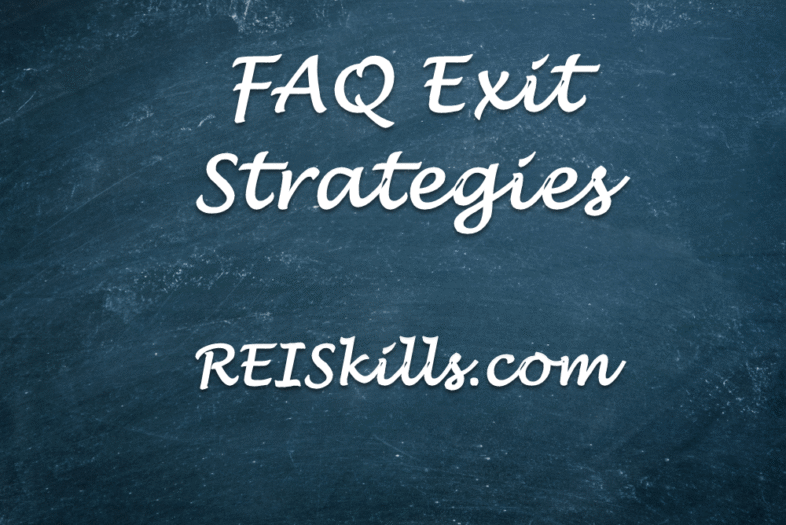Why an exit strategy is critically important and vital before you buy an investment property.
The Golden Rule of Investing: Plan Your Exit Before You Enter
An exit strategy is your pre-determined plan for how you will sell or otherwise “exit” the investment to realize your profit. It is not something you figure out after you own the property; it is the foundation upon which the entire investment decision is built.
Thinking of it like a road trip: You don’t just get in the car and start driving randomly. You decide your destination first (your profit goal), which then determines your route (your exit strategy). This dictates what car you need, what supplies to pack, and how much fuel you’ll need.
Here’s why this is so important and vital:
- It Defines What Type of Investment You Are Making
The same physical property can be four different investments depending on your exit strategy.
- Is it a Wholesale Deal? If your exit is to assign the contract to another investor in 30 days for a quick fee, you are a wholesaler. You care about finding a property priced far below market value.
- Is it a Fix-and-Flip (Retail)? If your exit is to renovate and sell to a homeowner in 6 months, you are a rehabber. You care about purchase price + repair costs being low enough to leave a profit after the retail sale.
- Is it a Buy-and-Hold Rental? If your exit is long-term cash flow and appreciation over 20 years, you are a landlord. You care about the rental income being higher than all expenses (mortgage, taxes, insurance, maintenance, vacancy).
- Is it a Seller-Finance Deal? If your exit is to sell the property to a buyer who can’t get a traditional loan and collect monthly payments with interest, you are a financier. You care about the buyer’s credit and the property’s long-term value.
Without a pre-defined exit strategy, you don’t know what kind of deal you’re even looking for.
- It Determines Your “Buy Box” and Maximum Offer Price
Your exit strategy directly tells you the maximum amount you can pay for a property. The math changes completely based on your goal.
- For a Flip: Your Maximum Offer = (After-Repair Value x 70%) – Repair Costs.
- Why? This builds in a 30% margin for profit, holding costs, realtor fees, and unexpected issues.
- For a Wholesale: Your Maximum Offer = Price an end-buyer investor will pay – Your Assigned Fee.
- Why? You are simply the middleman; your price is dictated by the market of cash buyers.
- For a Rental: Your Maximum Offer is based on the CAP Rate or Cash-on-Cash return, where the monthly rent must comfortably cover all expenses and provide your desired profit margin.
Buying a property without knowing your exit is like shopping without a budget—you will likely overpay.
- It Forces You to Conduct Proper Due Diligence
Knowing your exit forces you to ask the right questions before you buy.
- Flipping? You must deeply analyze repair costs, comparable sales (comps), and how long it will take to sell in that specific market.
- Renting? You must research local rental rates, vacancy rates, property management costs, and landlord-tenant laws.
- Seller-Financing? You must vet the creditworthiness of potential buyer-occupants and understand the legal documents required.
Without an exit strategy, your due diligence is unfocused and you miss critical red flags.
- It Manages Risk and Prevents You from Getting Stuck
The most dangerous position for an investor is being stuck with a property they don’t want and can’t profit from—a “money pit.” A clear exit strategy is your primary risk management tool.
- It ensures you have a viable path to profit and a timeline for getting your capital back.
- It helps you avoid emotional decision-making. When a deal starts to go sideways, you have a pre-set plan to follow instead of panicking.
- It prevents you from accidentally becoming a landlord when you intended to be a flipper (a common and often costly mistake).
- It Is Essential for Securing Financing
If you need to use private money, hard money, or even a partner’s funds, the first question they will ask is: “How are we getting our money back, and when?”
A well-researched and clearly articulated exit strategy demonstrates that you are a professional, serious investor who has a plan for repaying them. Without one, you will not be able to raise capital.
Conclusion: The Mindset of a Professional
Amateur investors buy properties they “like” or think are “a good deal.”
Professional investors buy a specific outcome that is mathematically proven to be profitable.
Your exit strategy is that outcome. It is the single most important factor that separates successful, intentional investors from those who gamble and often lose. You don’t buy a house; you buy a profit plan. The house is simply the vehicle to execute that plan.



